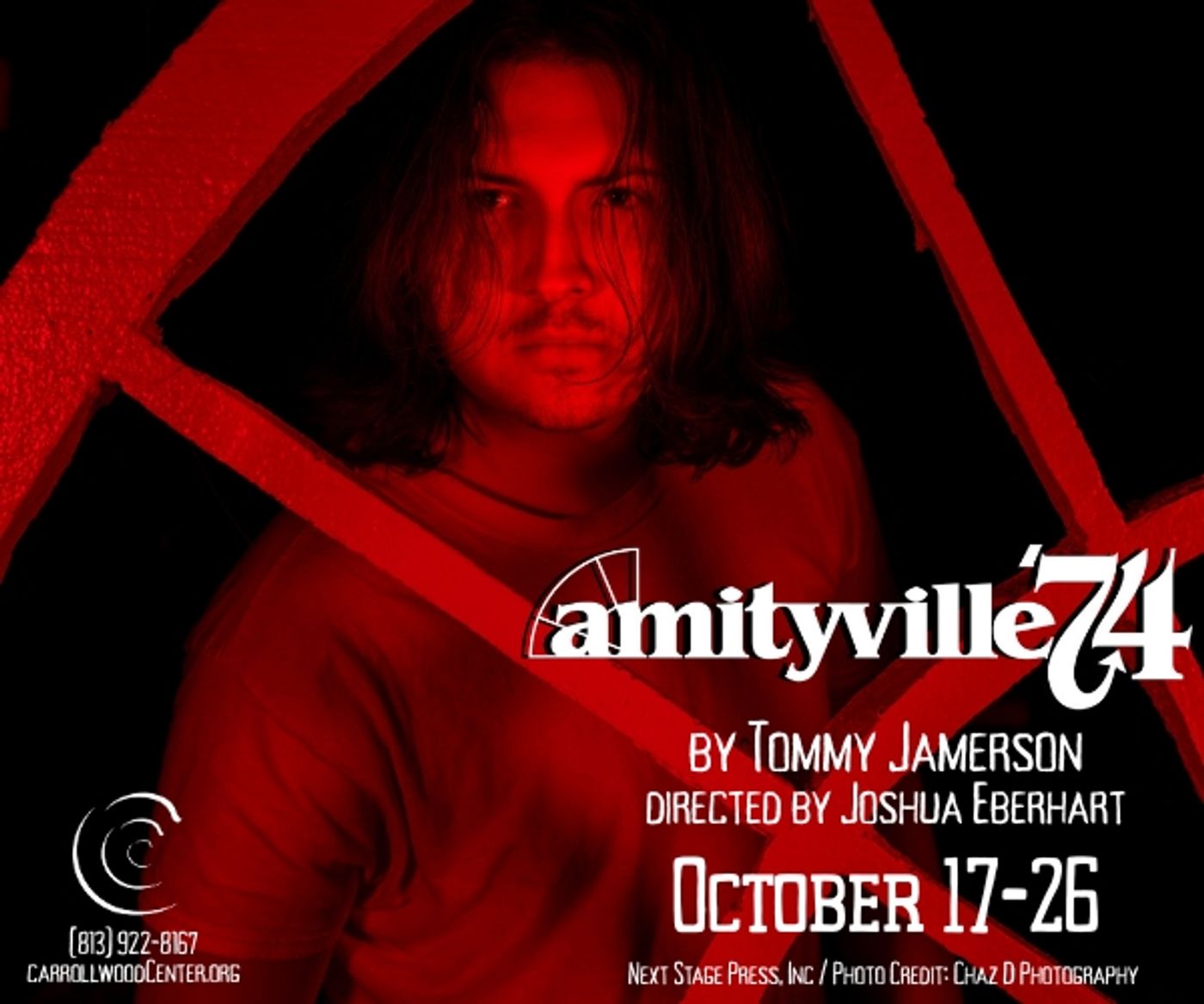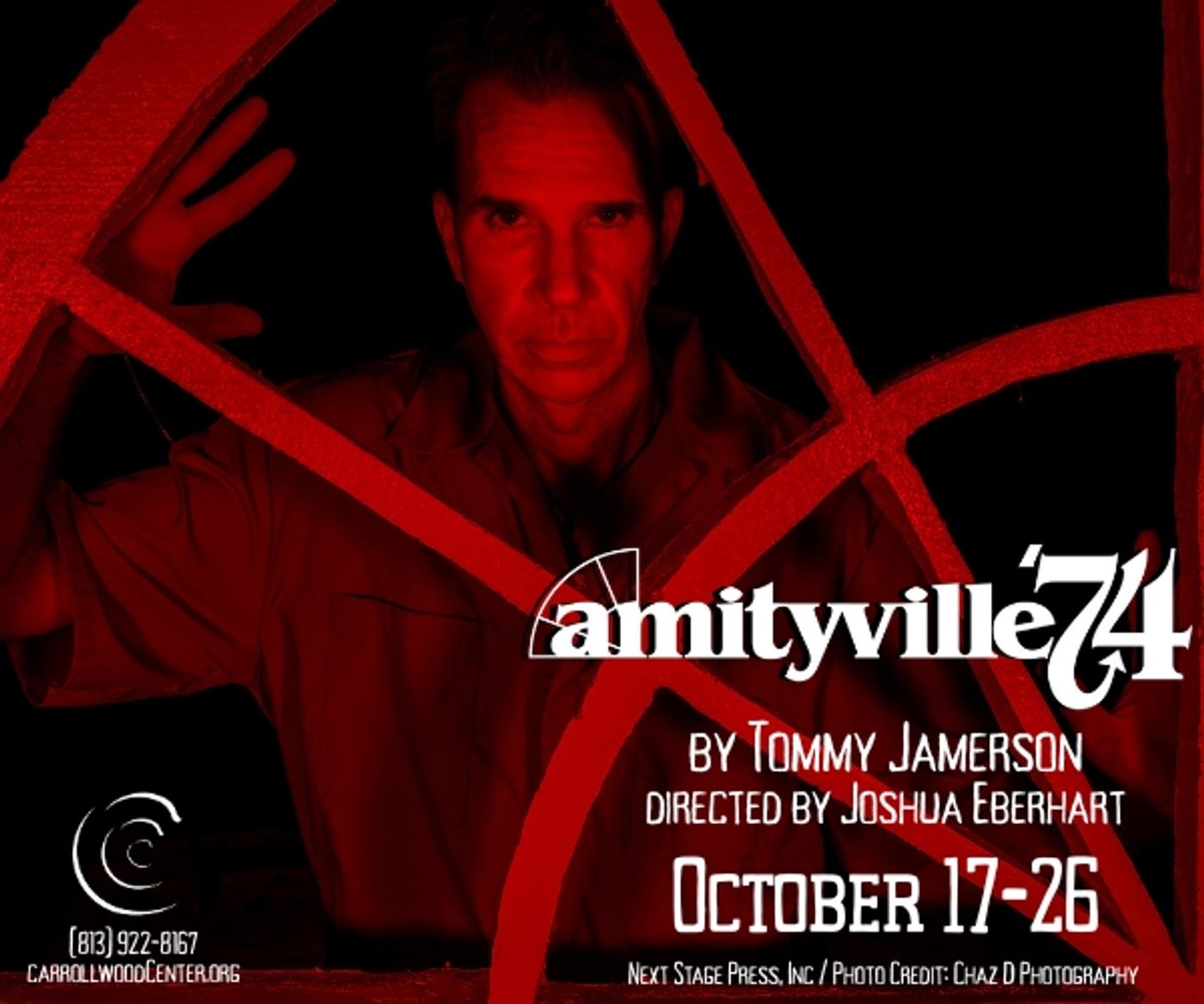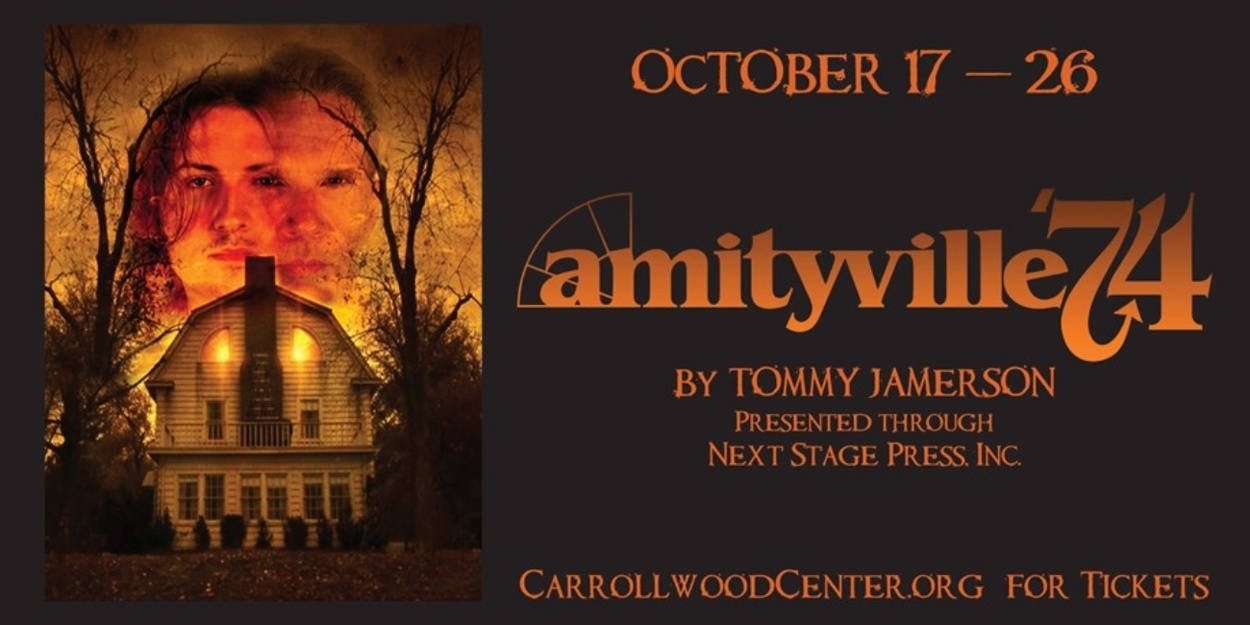This Friday, the Carrollwood Cultural Center invites audiences to look beyond the lurid headlines and confront the human story at the heart of Tommy Jamerson’s Amityville ’74. Under the direction of Joshua Eberhart, this gripping drama features Paul Berg as Ronald “Butch” DeFeo Jr. (2019), Donovan Dykes as Ronald “Butch” DeFeo Jr. (1974), and an outstanding ensemble including Jimmy Barringer (Ronald DeFeo Sr.), Melissa Mastromarchi (Louise DeFeo), Kore Trotti (Dawn DeFeo), Camila Palacios (Julie DeFeo), Kamyla Ospino (Jenny DeFeo), Peaches Brown (Alexis Russo), Anna Hoyt (Jodie), Chelsea Smith (Peg), with Mackley Fogarty and Samantha Sacasa rounding out the cast. The production promises a nuanced and haunting exploration of the circumstances leading up to one of America’s most notorious tragedies.
 In the early hours of November 13, 1974—at exactly 3:15 a.m.—the story follows Ronald “Butch” DeFeo Jr., who, in a moment that would shock the nation, used a .35 caliber Marlin rifle to murder his entire family. Drawing from decades of interviews and exhaustive research, Amityville ’74 guides viewers through the chilling and deeply human events that unfolded within the infamous Dutch Colonial at 112 Ocean Avenue—a home forever etched into history as the scene of the Amityville murders. Rather than sensationalizing the horror, the play courageously examines the trauma, abuse, and emotional turmoil that led to that fateful night, offering a compassionate yet unflinching look at the scars left behind and the truths that still haunt us today.
In the early hours of November 13, 1974—at exactly 3:15 a.m.—the story follows Ronald “Butch” DeFeo Jr., who, in a moment that would shock the nation, used a .35 caliber Marlin rifle to murder his entire family. Drawing from decades of interviews and exhaustive research, Amityville ’74 guides viewers through the chilling and deeply human events that unfolded within the infamous Dutch Colonial at 112 Ocean Avenue—a home forever etched into history as the scene of the Amityville murders. Rather than sensationalizing the horror, the play courageously examines the trauma, abuse, and emotional turmoil that led to that fateful night, offering a compassionate yet unflinching look at the scars left behind and the truths that still haunt us today.
Dykes, tasked with portraying a figure both infamous and deeply complex, approaches the role with empathy and nuance. “I tried not to treat him as a maniac. He was a real person facing all sorts of issues such as mental health, drug addiction, and emotional abuse. With the research that I had done, I tried to put myself in his shoes. Trying to understand the mental challenges and emotional disarray he was facing during that time, especially in a era where mental health didn’t have a prominent focus.”
Eberhart’s vision magnifies this focus on humanity: “I’ve always been drawn to stories that explore the darker side of human experience. Even as a child, I loved suspense and horror—not just for the thrill, but for the way those stories peel back the layers of fear, guilt, and vulnerability that define us. Tommy Jamerson’s Amityville ’74 immediately stood out because it’s not a typical haunted house story. It’s a story about the people before the horror—the moments, choices, and cycles of abuse that lead to a traumatic event and echo long after.”
The emotional demands of the script are unflinching. Dykes shares, “If I had to choose a particular moment in the show that I found most challenging, I would have to say the emotional abuse he faces from his father/family. I have a close relationship with my father as he helped shape me into who I am today, but with ‘Butch’ I have to play a role that has the complete opposite. Whenever I was face with one of those scenes, I always reminded myself of the person behind each character and how they really acted. Thankfully, I was blessed with amazing co-stars so it wasn’t too hard.”
The heart of Amityville ’74 lies in its refusal to sensationalize tragedy, instead confronting audiences with the complexities of trauma, mental illness, and the cycles of abuse that led to the fateful night. “DeFeo’s story is definitely a tragic one. He was a man who had mental problems that over time when faced with abuse and emotional distress, resulted in him making a drastic action that ended in a tragedy,” Dykes reflects.
Eberhart’s approach shuns sensationalism for emotional truth. “In staging the production, I wanted the audience to feel like they were living inside that slow unraveling. The set feels familiar yet uneasy, like a home filled with ghosts of memory. Lighting and sound became emotional cues—shifting from warmth to unease as the story darkens. With the cast, our focus was on restraint and honesty. Every pause, every look, every moment of silence carried the burden of what’s been endured—and what’s still to come.”
 In this intimate staging, the drama unfolds around a 2019 prison interview between Ronnie DeFeo and a reporter—both present on stage as silent witnesses to the replay of 1974. The result, Eberhart says, is “something between confession and haunting—a collision of truth and illusion where the past refuses to stay buried.
In this intimate staging, the drama unfolds around a 2019 prison interview between Ronnie DeFeo and a reporter—both present on stage as silent witnesses to the replay of 1974. The result, Eberhart says, is “something between confession and haunting—a collision of truth and illusion where the past refuses to stay buried.
“The true events surrounding the Amityville case are tragic and deeply unsettling, grounded in real trauma, abuse, and loss. For me, it was essential to approach that history with empathy rather than sensationalism. Tommy Jamerson’s script does this beautifully—it doesn’t exploit what happened; it examines the human story behind it. It looks at the pain, the fear, and the emotional decay that lead to the unimaginable.”
In directing the production, Eberhart chose not to replicate a documentary or stage a mere reenactment. He intended to capture and honor the emotional truth of the story, rather than adhering rigidly to every factual detail. While the creative team thoroughly researched the actual timeline and the intricate dynamics within the DeFeo family, this groundwork served as a starting point rather than a strict framework. Theatrical storytelling, in Eberhart’s vision, offered the freedom to delve into the underlying reasons behind the tragedy, moving beyond the surface-level events. Through thoughtful design, deliberate pacing, and nuanced performances, the production emphasized themes of isolation, pervasive silence, and the escalating tension that ultimately led to the infamous events.
“The heart of this production isn’t about horror for horror’s sake—it’s about empathy within darkness. By blending fact with feeling, we invited the audience to witness the humanity behind the headlines. Because ultimately, the story of Amityville ’74 isn’t just about what happened in one house—it’s about what happens when trauma, addiction, and abuse go unseen until it’s too late.”
For audiences, the takeaway is clear. “I hope the message the play conveys the audience is that not every evil action is cause by an evil person, but by a person who was troubled by the evil that this world can bring upon us,” Dykes says. “Ultimately, my approach was to treat the horror as human. The fear in Amityville ’74 doesn’t come from what’s supernatural—it comes from the reality of pain, abuse, and the trauma that leads to destruction. My hope is that audiences leave not just unsettled, but reflective, recognizing that the real monsters in this story are the wounds we carry and the ones we inflict on those we love.”
Amityville ’74 is October 17-26 at Carrollwood Cultural Center. Learn more and purchase tickets at carrollwoodcenter.org/series/amityville-74. (For mature audiences: Violence/Language.)


